牛津译林版英语9B Unit2 Welcome to the unit导学案
- 格式:doc
- 大小:48.00 KB
- 文档页数:3
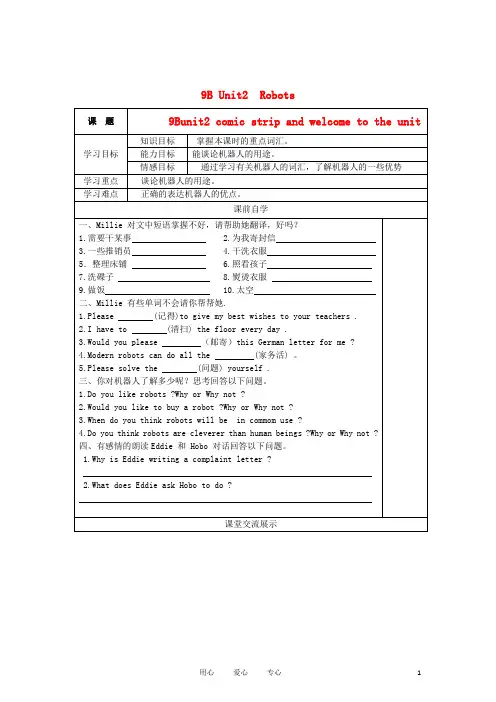
9B Unit2 Robots9BUnit2 Robots参考答案comic strip and welcome to the unit二、用所给词的适当形式填空。
zier2. explorer3.well4.children5.dishes三、根据提示,完成下列句子。
1.explore dangerous places2.nood more3.do post for4.what do 5why did 6.listen to explain.Reading (1)一、根据句意和所给的中文写出句中所缺的词。
Saleman ironed laundry virus dustbin knock mess trouble一、选用所给词组的适当形式填空.1. messing2. own3. in order to4. were made5. rice cooker Reading (2)一、根据句意及中文写出适当的单词。
1.owns2.virus3.dustbin4.mess5. dirty二、完成下列句子1.I don't know when the machine caught a virus .2.By the way ,who is the first perdon to own a rabot ?3.The machine is washing is bought by me yasterday .4.I bought a robot in order to have more time .Vocaburay二、选用所给词组的适当形式填空.1.arms2. hands3.speakers4. wheels5.camera6. batterriesGrammarA一、选择正确的答案。
1.B2.C3.D4. A5.B ;6.A7.B8.B9.C 10.D二、用所给出的疑问词完成下列句子1.where2.what3.who4.which5.when6.how7.what8.why9.what 10.why Grammar B & C一、完成下列句子1. in order to2. as a result3.need in order to4.because of5.to in order to二.用in order to 和as a result完成下列句子。
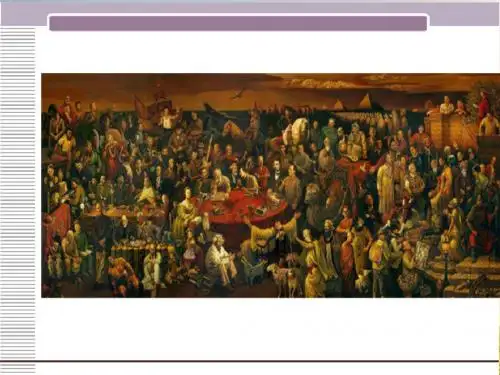
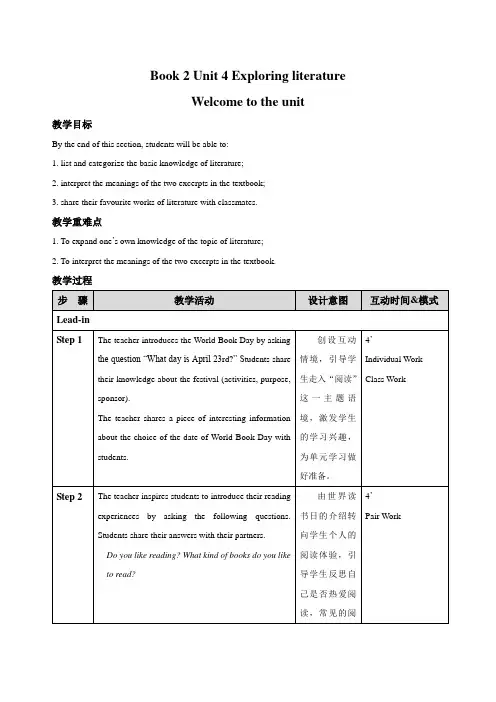
Book 2 Unit 4 Exploring literatureWelcome to the unit教学目标By the end of this section, students will be able to:1. list and categorize the basic knowledge of literature;2. interpret the meanings of the two excerpts in the textbook;3. share their favourite works of literature with classmates.教学重难点1. To expand one’s own knowledge of the topic of literature;2. To interpret the meanings of the two excerpts in the textbook.教学过程读种类有哪些,为接下来有关文学信息的讨论做铺垫。
Homework checkingStep 3 Before class, the teacher has asked students to surf the Internet or refer to some reference books to get someinformation about literature. Topics related to literaturemay include genres of literature, famous writers andtheir works and famous quotes, etc. Students work ingroups and report their works in the form of amind-map.引导学生自主探究总结出有关文学的基本信息,并开展小组合作,将组员收集的各种信息利用思维导图进行梳理和整合。
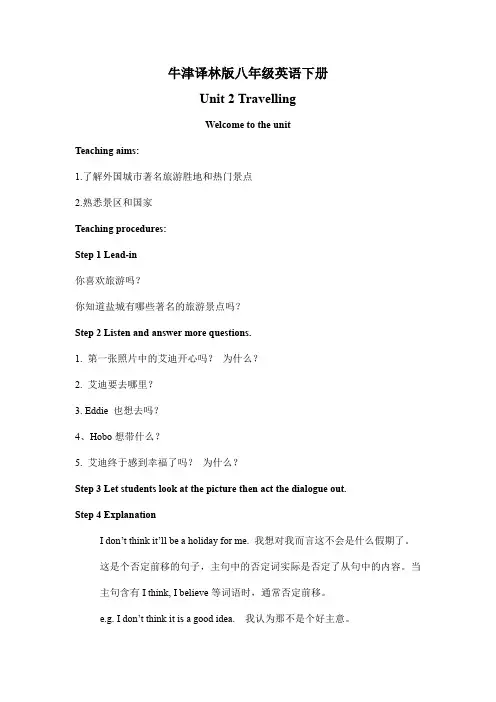
牛津译林版八年级英语下册Unit 2 TravellingWelcome to the unitTeaching aims:1.了解外国城市著名旅游胜地和热门景点2.熟悉景区和国家Teaching procedures:Step 1 Lead-in你喜欢旅游吗?你知道盐城有哪些著名的旅游景点吗?Step 2 Listen and answer more questions.1. 第一张照片中的艾迪开心吗?为什么?2. 艾迪要去哪里?3. Eddie 也想去吗?4、Hobo想带什么?5. 艾迪终于感到幸福了吗?为什么?Step 3 Let students look at the picture then act the dialogue out.Step 4 ExplanationI don’t think it’ll be a holiday for me. 我想对我而言这不会是什么假期了。
这是个否定前移的句子,主句中的否定词实际是否定了从句中的内容。
当主句含有I think, I believe等词语时,通常否定前移。
e.g. I don’t think it is a good idea. 我认为那不是个好主意。
Step 5 Presentation展示一些关于中国一些名胜古迹的图片。
Step 6 Welcome the unit任务如果有机会(机会)出国旅游(出国旅游),你会去哪里?然后展示一些国外热门景点的图片:Step 7 Read and guess1. 它是世界上最长的墙。
2. 是法国人送的礼物。
它代表自由。
3. 听起来像披萨。
它在倾斜。
它可能有一天会倒下。
4. 女孩有鱼尾而不是腿。
5. 它是世界上最繁忙的表演艺术中心。
6. 它是伦敦泰晤士河上的一座大桥。
它有双塔。
Step 8 Work in pairsStep 9 Do some exercisesStep 10 Homework1. 准备一份事实档案并写下你的假期。
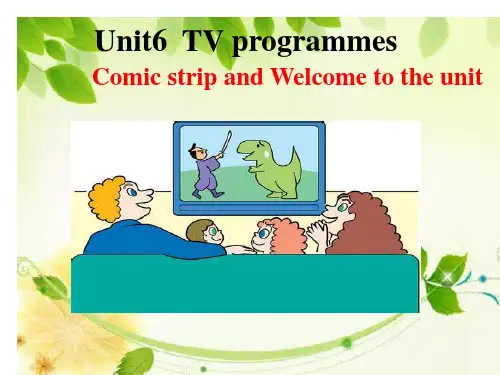
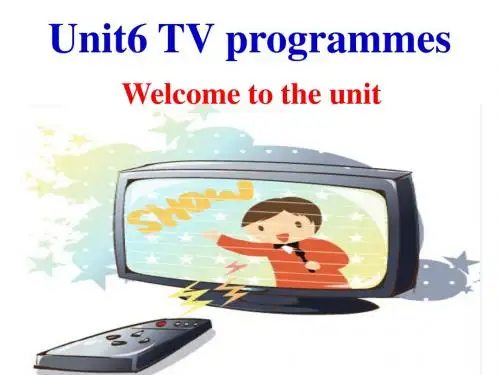
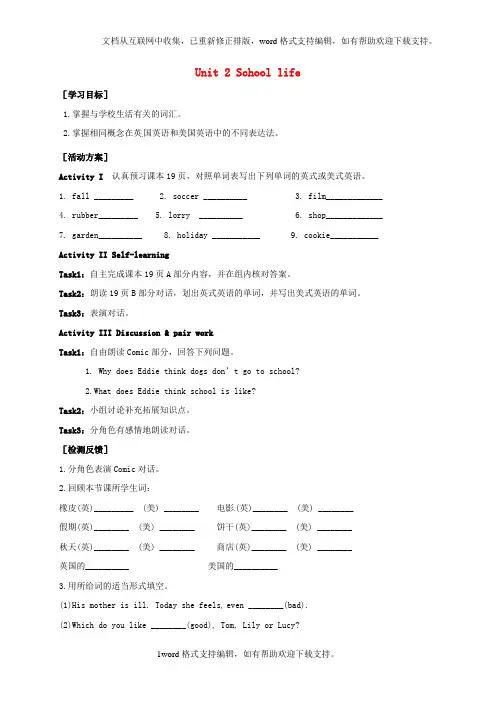
Unit 2 School life[学习目标]1.掌握与学校生活有关的词汇。
2.掌握相同概念在英国英语和美国英语中的不同表达法。
[活动方案]Activity I 认真预习课本19页,对照单词表写出下列单词的英式或美式英语。
1. fall _________2. soccer __________3. film_____________4. rubber_________5. lorry __________6. shop_____________7. garden__________8. holiday ___________9. cookie___________ Activity II Self-learningTask1:自主完成课本19页A部分内容,并在组内核对答案。
Task2:朗读19页B部分对话,划出英式英语的单词,并写出美式英语的单词。
Task3:表演对话。
Activity III Discussion & pair workTask1:自由朗读Comic部分,回答下列问题。
1. Why does Eddie think dogs don’t go to school?2.What does Eddie think school is like?Task2:小组讨论补充拓展知识点。
Task3:分角色有感情地朗读对话。
[检测反馈]1.分角色表演Comic对话。
2.回顾本节课所学生词:橡皮(英)_________ (美) ________ 电影(英)________ (美) ________假期(英)________ (美) ________ 饼干(英)________ (美) ________秋天(英)________ (美) ________ 商店(英)________ (美) ________英国的__________ 美国的__________3.用所给词的适当形式填空。
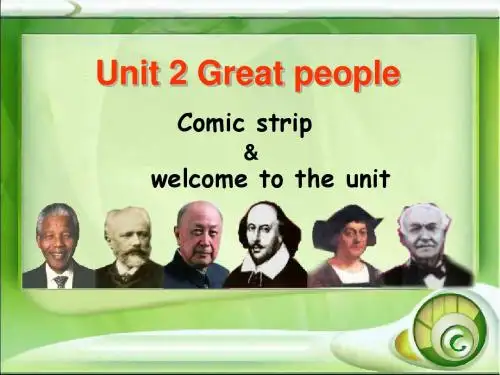
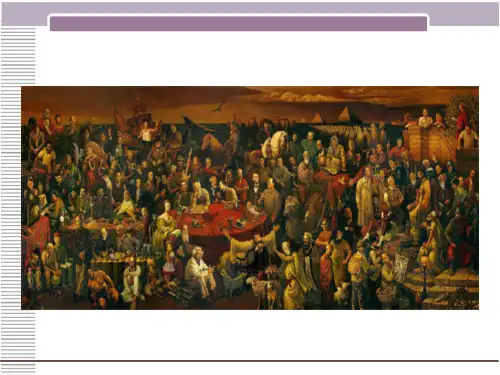
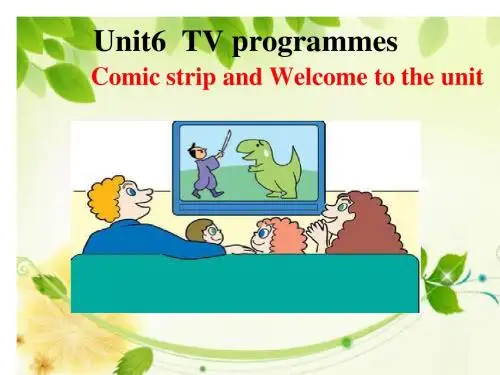
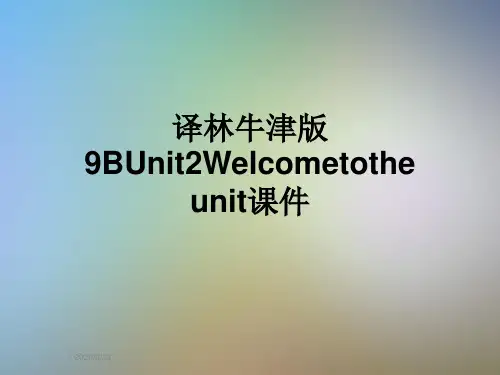
M7U2 Fit for life第二课时Welcome to the unit & Reading (1) 导学案【学习目标】1. 学生在课前自学【典型例题】中关于阅读理解主旨题、段落大意题的解题技巧,并独立完成【巩固练习】中的五道主旨和段落大意题,最后根据【参考答案】中的详解体会做题心得。
2. 学生能在课上合格地默出老师选的P76词汇表M7U2第一部分(chemist—bleed)20个单词;3. 学生通过阅读Reading部分的课文内容,合格完成相应的理解练习;4. 学生通过语法填空(一篇对课文的概括性文章)和书P21 Part E(选词填空)对课文内容再消化。
【要点梳理】(本节内容上课时使用,课前不用做)[Step 1] DictationRead the words after the teacher and have a dictation (20 words; teacher reads the words in English; students write them down both in English spelling and their Chinese meanings as well as their part of speech).[Step 2] Welcome to the unit1. What’s the meaning of “Fit for life”, the title of this unit ?2. How do we keep fit?3. When people fall ill, what will they do?[Step 3] Reading: Two life-saving medicines (Comprehension)1. Fast reading for general idea: Play the flash of the medical article and students read the content offered in the flash, after which students answer three questions:(1) When did the medicine “aspirin” appear?(2) What award did Fleming, Florey and Chain share?(3) The article is mainly about the _________ of two life-saving drugs. (主旨题)A. inventionB. functionC. influence2. Careful reading for details: Read the text again to find the answers to the following questions:(1) What is the main function of aspirin?(2) What other functions does aspirin have?(3) What is the main function of penicillin?(4) Who is/are the most important person(s) in creating penicillin? (开放题)A. Fleming.B. Chain.C. Florey.D. All the people above.(5) What do the two medicines have in common? (概括题)3. Summary for consolidation: Finish two blank-filling exercises to consolidate what is learned. (1) A summary of the article (语法填空)If you open up any medicine cupboard or go to 1. __________ medicine counter in the world, it is 2.____________ (like) that you will find aspirin and penicillin.Aspirin 3._______________ (invent) in 1897. The first trials of this medicine took place in 1899. In 1900, aspirin was sold in shops 4.___________ the form of tablets. Not only has aspirin proved vital for reducing fever and 5._____________ (help) stop pain, but there are also other things that aspirin can help with. In 1977 a study 6.___________ (carry) out in the USA showedthat aspirin could prevent stokes.Another drug that has helped increase 7._________ standard of people’s health is penicillin. It was discovered by a Scottish scientist named Alexander Fleming in 1928. In 1940, two other scientists managed 8.__________ (make) and test the new drug in large 9.___________ (quantity). Due to the widespread use of penicillin, many lives were saved. Penicillin became the greatest drug of the 20th century, 10.______________ (save) millions of lives(2) 书P21 Part E: Blank-filling with the given words (选词填空)[Step 4] Read the text aloud following the recording. (朗读也重要)【典型例题】(本节内容课前自学)阅读理解策略指导:主旨题和段落大意题阅读理解解题策略(文章主旨题)一、略读法是理解文章大意的快速而有效的方法,略读的关键是能在抓住文章要点的前提下,以个人最快的速度阅读,主要目的是尽快获得足够的信息以便准确地回答问题,利用略读法去做阅读时,要特别注意首尾两段,要学会寻找文章段落的主题句,这是高效省时地抓住段落要点的捷径,同时也是准确理解文章大意的有效途径。
英语9译林牛津版unit2welcome学案1.Whilethepaceofchangeinthemodernworldgetsfasterandfaster,peoplearebecomingmoreandmoreawareoftheneedofpreservetheworld’sheritagE、随着当今世界进展变化的步伐日益加快,人们也愈来愈意识到保护世界遗产的必要性。
①t hepaceofchange(社会)变化的步伐Itisverydifficulttokeepupwiththerapidpaceofchange.跟上社会变化的步伐是特别困难的。
keeppacewith与……保持同;跟上……步伐我们应小断地学习新知识,了解新技术,从而跟上时代前进的步伐。
_______________________________________________________________________________ ______________________________________________________________________________.②句中beaware作“意识到”解,后可接of短语或that从句。
他朝那黑暗的巷口走去,全然没有意识到眼前的危险.___________________________________________________________________.直到她开口对他说话他才晓得她在面前。
_____________________________________________________________________.司机完全晓得他在以每小时70英里的时速开车。
_____________________________________________________________________. awareness n、认识;意识;明白ItisimportantthatstudentsdevelopanawarenessofhowtheInternetcanbeuseD、重要的是学生逐渐懂得如何使用互联。
第 2 单元第 2 课时教学设计课题名称Reading 1Teaching aims:1. To guess general meanings from keywords and context2. To skim text for overall meanings and scan for detailsTeaching procedures:Step 1 ackground information:Step 2 Explain the context. Simon is reading an artic le about a famous astronaut, Neil Armstrong. Ask students whether they know when the first man walked on the moon. Also ask them if they know the names of the first two men who walked on the moon. Tell students that they will learn more a bout men visiting the moon in the reading passage.Step 3 Students listen to the recording for the first three paragraphs and then read them after the tape again.Step 4 Do True or False questions to check understanding of the first three paragraphs.A Neil Armstrong was born in the 1940s.B He flew in an aero plane when he was six.[]C The Gemini 8 mission is all about star signs.D Gemini 8 landed in the USA.E Neil Armstrong received h is student pilot’s license when he was 15.F Neil Armstrong successfully brought the spacecraft down into the western Pacific Ocean when Gemini 8 was out of control.G Ask students to scan the first three paragraphs and underline the new words. Encourage them to explain the words to the class in English.Step5 Language points:a. at the age of… =when sb was … years oldmistakes and raise their hands when they have a questions .Part B1.Explain the context . Millie and Simon are talking about the famous people .2.Select two more able students to play the role of Millie and Simon . Ask them to readthe conversation aloud .3.Ask students to work in pairs . Encourage them to read the conversation aloud .Thenask students to talk about some famous people they admire . Re mind them to use Millie and Simon’s conversation as a model .As you walk around the class , commend students on any parts they do particularly well . Try not to criticize students too much on their spoken English ,as this can be discouraging .教后反思(红字)。
九下 Unit 2 Great people Period 1 Welcome to the unit
【学习目标】 1. 认识并了解一些有关名人的词汇。 2. 了解一些名人的基本信息。 【导学提纲】 A. 跟读磁带,预习P 20—21,并默写单词和词组。 1. 发明者______________ 2. 发明______________ 3. 斗士_______________ 4. 发明物______________ 5. 欧洲人____________ 6. 俄罗斯人___________ 7. 南非人______________ 8. 历史上最伟大的人物________________________ 9. 听说某人 ___________________ 10. 一个发明者_______________________________ 11. 发现美洲的首批欧洲人之一_________________ 12. 为非洲黑人权利而斗争的战士_______________ 13. 一位英国文学巨匠_________________________ 14. 中国航天技术工程的先锋___________________ 【展示交流】 1.Comic Strip 回答问题并表演。 2.Part B匹配人名与其成就。 【课堂反馈】 一、词汇。 1. Thomas Edison had lots of ________________(发明物)during his lifetime. 2. He is no more an ________________(发明者)than an engineer. 3. The ancient Chinese _______________(发明)tea that is now very popular all over the world. 4. The little boy wants to become a brave ___________ (斗士)when he grows up. 5. These special clothes are those ____________________ (Russia). 6. —Who do you think (be)the greatest scientist in China? —I think Yuan Longping is. 7. Qian Xuesen devoted a lot to_________ (China) space technology programme. 8. Marco Polo was one of the most famous ___________ (Europe) who came to China. 二、单项选择。 ( ) 1. Gilbert __________electricity and Edison ________ the electric light bulb. A. discovered, invented B. discovered, discovered C. invented, invented D. invented, discovered ( ) 2. —Have you ________ Zhang Lili? —Yes, she is the most beautiful woman teacher in China. A. heard of B. heard from C. heard out D. heard ( ) 3. What will happen in the future? A. are you thinking B. do you think C. you think D. did you think ( ) 4. China is __________ the east of Asia, and ____________ the west of Japan. A. in, to B. on, to C. in, on D. to, on ( ) 5. —Has your friend completed his design? —Not yet. He _______on it last night. A. worked B. has worked C. is working D. was working 三、翻译句子。 1.哥伦布是历史上最伟大的探险家之一。 Columbus was one of in history. 2.许多人改变了我们生活的方式。 Many people . 3.鲁迅是中国文学巨匠。 Lu Xun was a great writer . 4.这是我遇到的最糟糕的天气。 This is . 5.他总是第一个完成工作。 He is always ______________________________________________________. 四、完型填空。 In North America people are always in a hurry. Children have 1 lessons or sports activities after school. Parents often work later and don’t get home 2 7 or 8 o’clock at night. More than 50 percent of women work at full-time jobs, and many people do part-time work. It isn’t a 3 that the North American family doesn’t have the time to eat many meals together. When a family takes time to eat a meal 4 often there isn’t enough time to 5 the food. That is 6 “fast food” is so popular in North America. People spend about 40 percent of their food dollars 7 fast food. Fast food is food such as hamburgers, pizza, sandwiches, or fried chicken. People usually 8 the food from a restaurant chain (连锁店) such as Pizza Hut, McDonald’s, or Kentucky Fried Chicken. Fast food 9 work and time, 10 it is not very healthy. Fast food is 11 in many countries all over the world. Not everyone is happy about the 12 of North American fast food. A group of people in Italy want to 13 against the spread of American fast food. They do not want any more fast-food chains to open restaurants in 14 country. Their group is 15 the Slow Food Movement. They plan to fight against the spread of fast food everywhere. ( )1. A. special B. double C. normal D. modern ( )2. A. as B. after C. until D. unless ( )3. A. shock B. surprise C. pity D. decision ( )4. A. alone B. once C. together D. again ( )5. A. cover B. serve C. create D. prepare ( )6. A. how B. what C. when D. why ( )7. A. about B. on C. in D. at ( )8. A. share B. fetch C. buy D. sell ( )9. A. gives B. saves C. provides D. wastes ( )10. A. but B. and C. or D. so ( )11. A. fantastic B. different C. natural D. popular ( )12. A. spirit B. situation C. spread D. price ( )13. A. turn B. fight C. press D. hold ( )14. A. their B. his C. her D. its ( )15. A. called B. spelled C. thought D. known 五、首字母填空。 Nelson Mandela, former South African president, was born in an African royal family on July 18, 1918. His great-grandfather was a king and his f 1 was a clan chief(部落酋长) . But Mandela chose a life path of revolution(革命) i 2 of royalty(皇室成员). At that time, South Africa was ruled by racism(种族主义). In 1948, the government passed a law that stopped black people from l 3 or traveling where they wanted. Black people didn’t have the right(权利) to v 4 , either. Mandela didn’t think that was r 5 . He organized many campaigns against it. Because of this, in 1962, he was a 6 . He spent 27 years in prison. A 7 he was set free in 1990, he chose to forgive his enemies. He shook hands with the people who wanted him to d 8 . He also encouraged black people to forgive whites. His efforts won himself the Nobel Peace Prize in 1993 and a year later, for the first time in South Africa’s history, black people stood in line with whites to vote. Mandela b 9 the first black president of South Africa at the age of 75. On Dec 5, Mandela p 10 away at the age of 95. 1. _________ 2. __________ 3. __________ 4. ___________ 5. ___________ 6. _________ 7. __________ 8. __________ 9. ___________ 10. __________